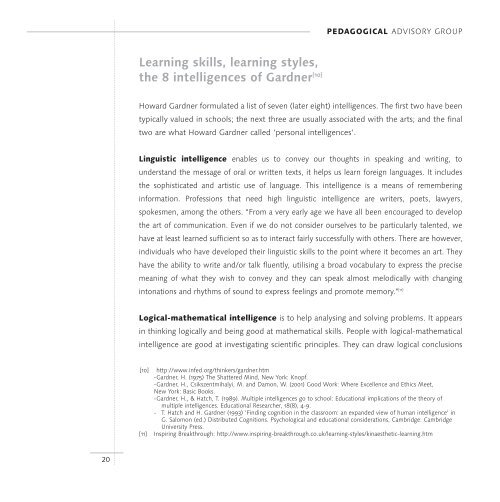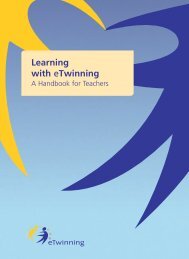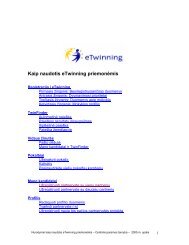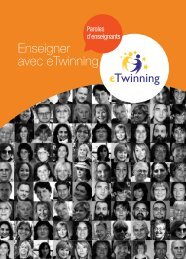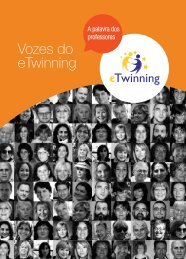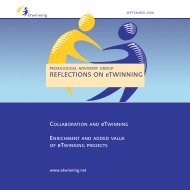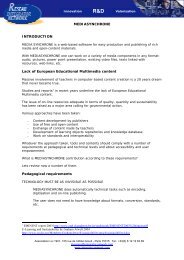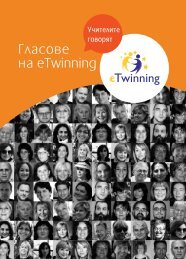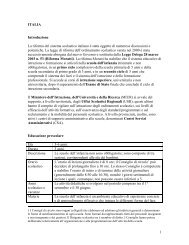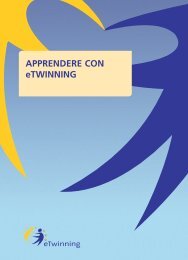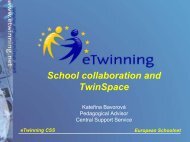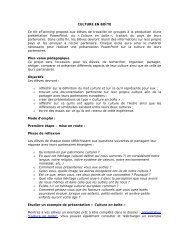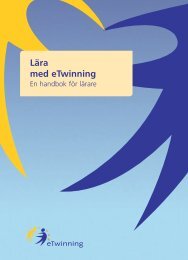REFLECTIONS ON eTWINNING
REFLECTIONS ON eTWINNING
REFLECTIONS ON eTWINNING
Create successful ePaper yourself
Turn your PDF publications into a flip-book with our unique Google optimized e-Paper software.
PEDAGOGICAL ADVISORY GROUP<br />
Learning skills, learning styles,<br />
the 8 intelligences of Gardner [10]<br />
Howard Gardner formulated a list of seven (later eight) intelligences. The first two have been<br />
typically valued in schools; the next three are usually associated with the arts; and the final<br />
two are what Howard Gardner called 'personal intelligences'.<br />
Linguistic intelligence enables us to convey our thoughts in speaking and writing, to<br />
understand the message of oral or written texts, it helps us learn foreign languages. It includes<br />
the sophisticated and artistic use of language. This intelligence is a means of remembering<br />
information. Professions that need high linguistic intelligence are writers, poets, lawyers,<br />
spokesmen, among the others. “From a very early age we have all been encouraged to develop<br />
the art of communication. Even if we do not consider ourselves to be particularly talented, we<br />
have at least learned sufficient so as to interact fairly successfully with others. There are however,<br />
individuals who have developed their linguistic skills to the point where it becomes an art. They<br />
have the ability to write and/or talk fluently, utilising a broad vocabulary to express the precise<br />
meaning of what they wish to convey and they can speak almost melodically with changing<br />
intonations and rhythms of sound to express feelings and promote memory.” [11]<br />
Logical-mathematical intelligence is to help analysing and solving problems. It appears<br />
in thinking logically and being good at mathematical skills. People with logical-mathematical<br />
intelligence are good at investigating scientific principles. They can draw logical conclusions<br />
[10] http://www.infed.org/thinkers/gardner.htm<br />
-Gardner, H. (1975) The Shattered Mind, New York: Knopf.<br />
-Gardner, H., Csikszentmihalyi, M. and Damon, W. (2001) Good Work: Where Excellence and Ethics Meet,<br />
New York: Basic Books.<br />
-Gardner, H., & Hatch, T. (1989). Multiple intelligences go to school: Educational implications of the theory of<br />
multiple intelligences. Educational Researcher, 18(8), 4-9.<br />
- T. Hatch and H. Gardner (1993) 'Finding cognition in the classroom: an expanded view of human intelligence' in<br />
G. Salomon (ed.) Distributed Cognitions. Psychological and educational considerations, Cambridge: Cambridge<br />
University Press.<br />
[11] Inspiring Breakthrough: http://www.inspiring-breakthrough.co.uk/learning-styles/kinaesthetic-learning.htm<br />
20


